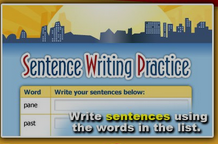I remember visiting a school a few years ago and having a teacher ask me if it would be possible to develop a way for the students to practice using their words in sentences. She explained to me that she always had each student write a sentence for each word on the list.
Our response, which only took us a month or so to develop, was Sentence Writing Practice and Paragraph Writing Practice. The objective of each activity is that the students are supposed to write sentences or paragraphs using all the words from their list.
But once we got started, we added a number of features that teachers seem to really like.
- The students have the opportunity to review their writing before submitting it to the teacher. They can even have the computer read their sentence or paragraph to them. Hearing their own writing read aloud helps many students revise their work.
- The teacher can customize the writing instructions. Popular ideas for new instructions:
| Sentence Writing Instructions | Paragraph Writing Instructions |
|---|---|
| Practice writing your own sentences. | Using the words above, write a paragraph below. |
| Write a definition for each word. | Write an expository paragraph using your word list. |
| Write a synonym for each word. | Write a narrative paragraph using your word list. |
| Write a riddle for each word on your list. | Write a poem using your word list. |
| Write an analogy for each word on your list. | Write a persuasive article using your word list. |
3. Instructional videos can be assigned. A few dozen instructional videos* are available and can be assigned by the teacher. For example:
| Sentence Writing Videos | |
|---|---|
| Subject/Verb Agreement | Students learn the basic idea of subject verb agreement and what to look for when choosing the correct verb form. |
| Crazy Commas | Students learn three basic comma rules and view examples to help them better understand. |
| More Comma Rules | Students learn additional comma rules, why proper comma usage is important and how they help make the meaning of a sentence clear. |
| Declarative & Interrogative Sentences | Students learn about these two different sentence types and what the end punctuation should be for each one. |
| Imperative & Exclamatory Sentences | Students learn what each of these sentence types accomplish, view examples of each and learn about the punctuation used for each one. |
| Paragraph Writing Videos | |
|---|---|
| Topic Sentence | Students learn what the topic sentence does, view examples and a good formula to remember when writing a topic sentence. |
| Supporting Details | Students learn what supporting details are, how they build a paragraph, what kind of information they can include and how they relate to the topic sentence. |
| Closing Sentence | Students learn what a closing sentence, or concluding sentence is, what it accomplishes and where it goes within a paragraph. |
| Punctuating Compound Sentences | Students learn what a compound sentence is and what a run on sentence is. They also learn how to fix a run on sentence by using proper punctuation and linking words, or coordinating conjunctions. |
| Don’t Get Into A Sentence Rut | Students learn how to avoid having all their sentences sound the same and make them more interesting by switching the words around. |
| Descriptive Paragraphs | Students learn how to write descriptive paragraphs by using adjectives and actions verbs. They also learn how to ‘paint a picture’ for their reader using the five senses. |
| Narrative Paragraphs | Students learn what a narrative paragraph must do and read two examples of well-written narrative paragraphs. |
*The instructional writing videos are provided by Time4Writing, from their online writing classes.


Carol Garhart Mooney’s book “Use Your Words” is a short and easy read; yet, is full of wonderful information on how to better communicate with young children.
Amazing idea!😁😁😁😁😁😎😎😎😎
Spelling City truly is amazing!